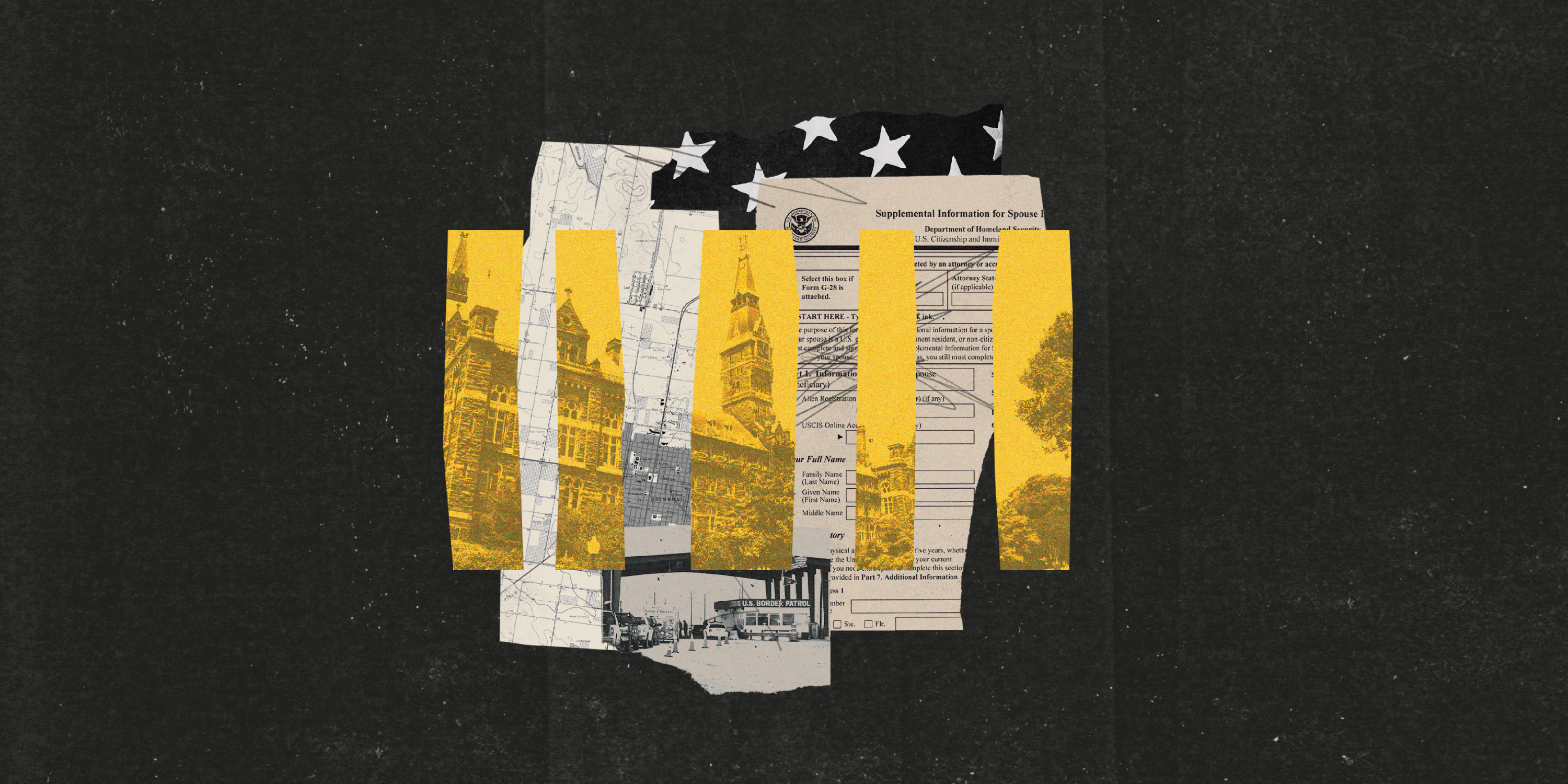While the rest of the class of 2023 is settling in, one student is still trying to get to campus.
Georgetown’s class of 2023 was moving in. Eager freshmen rolled suitcases down the sidewalks, and nervous parents double-checked that their children had enough pairs of socks and extra sets of sheets. But as the new school year began, one member of Georgetown’s community watched the action from hundreds of miles away. Lia (COL ’23), whose name has been changed to protect her identity, will defer beginning her college education until January 2020 because of obstacles caused by her documentation status.
Between Lia and Georgetown lies the rapidly changing political landscape of immigration legislation. Her home in Texas is within 100 miles of the U.S.-Mexico border, which means that immigration officials only need to suspect a person has violated an immigration law to demand identification. At airports near her, she could be asked to show her documents to immigration officials. If she lies about being a U.S. citizen, she risks deportation. Even if she escapes deportation, dishonesty could prevent her from getting legal permanent residency or citizenship in the future.
Lia could have driven to another airport deeper into the state, but drug checkpoints on the major highways made this another perilous option. Any method of travel to D.C. could jeopardize Lia’s safety and any future attempts to become a legal resident. She considered braving the checkpoints in order to come to Georgetown in August—her light skin and knowledge of English might allow her to pass by immigration officials undetected, she said—but ultimately decided that the threat was too great. “I did not want to either get apprehended, get deported, or to have to lie and jeopardize my whole future.”
Since she isn’t a Deferred Action for Childhood Arrivals (DACA) recipient, she could possibly apply for a student visa as a Mexican citizen, a risky pursuit as she can’t prove she lives in Mexico. Being granted a student visa would alleviate her fears of deportation, but she wouldn’t be eligible for scholarships at many universities that would consider her an international student. The layers of the U.S. immigration system combined with the bureaucracy of higher education are so complex that Lia isn’t even confident that she fully understands all the intricacies of her own situation. Every time she solves one problem, another appears.
When she began researching universities during her junior year of high school, Lia weighed her options carefully. Which schools had the best support systems in place for undocumented students who did not qualify for DACA? Which schools would value her both as a regular student with regular problems but also as an undocumented immigrant? And then came the financial concerns. Because she is not a U.S. citizen, Lia cannot qualify for federal financial aid, and school-provided aid packages for undocumented students vary widely between universities.
Further complicating Lia’s situation was her lack of any protection from the U.S. immigration system. Lia and her family arrived in the United States about six months before President Barack Obama enacted DACA, which allows people who entered the country as children without documentation to work and attend school without the possibility of deportation. To be eligible for DACA, a person must have continuously lived in the United States since June 15, 2007. Lia missed the cutoff.
***
Lia was 10 years old when a drug cartel kidnapped her father in 2011. She recalled her half brother rushing into the room in their home in Mexico to break the news to her mother—immediately, her stomach sank.
“I was so young at the time, so they didn’t want to tell me what was going on, but I knew something was wrong,” Lia said. “I saw the fear in my mother’s eyes.”
Lia’s father, whom the Voice is not identifying for his safety, was on his way to the bank when he was mistaken for someone else and abducted by members of the cartel. Her family left their home in a rush, knowing that Lia’s father had his ID with him, meaning that the cartel would know where to find his family.
When the situation was finally explained to her, Lia locked herself in a room and cried herself to sleep. The family had no knowledge of her father’s whereabouts, or if he would return alive. The cartel members beat and threatened him for 12 hours until they realized they had the wrong man. Around 3 a.m. the next morning, he was released. He walked several miles until he found a gas station with a phone to call home. When he returned to his family, he bore lacerations on his wrists and ankles, and cigarette burns covered his body.
The Washington Post reported that Mexico saw around 12,000 homicides due to drug-related violence in 2011, a particularly violent year for the Mexican government’s war on organized crime groups responsible for smuggling and selling narcotics. Lia said that this violence permeated her life before her father’s kidnapping, but when it struck her family, it took on a new gravity.
“I had seen bad things happen in Mexico. It was common for me to be at home and hear gunshots near the area. So I had been used to that certain level of trauma,” Lia said. “But when it happened to my father, I was just so incredibly scared and honestly didn’t know what to do.”
For Lia and her family, their country was no longer safe. Today, more than seven years since she left Mexico, Lia still loves the country, but she cannot see herself returning permanently. “I hate to think about Mexico as a dangerous place,” she said. “It’s just such a hard hitting thing to know that I wouldn’t feel at home in what was supposed to be my home.”
In order to prevent Lia’s father from reporting his kidnappers to the authorities, the cartel threatened his family, specifically Lia. With this danger looming over their heads, Lia’s family fled to Texas and applied for asylum in early 2012. To qualify for asylum, an applicant must be able to credibly prove to a judge that they are at risk of persecution in their country of origin on the basis of religion, race, nationality, political affiliation, or membership of a certain social group. Though the family had been directly threatened by the cartel, a judge ruled that their application for asylum did not meet the required standards because the abduction was a random event not motivated by bias against a certain group.
Denied asylum in the United States but scared to return to Mexico, Lia and her family had a choice: remain in Texas without legal documentation and risk deportation, or go back to Mexico and hope that the cartel did not make good on it’s threats. They chose to stay in Texas, but Lia couldn’t ignore the sting of rejection she felt.
“We were relying that the U.S. would help us. You know, you grow up in Mexico thinking about the U.S. as the land of the free, home of the brave. And we were like ‘they’re gonna help us, we’re in this time of need,’” Lia said. “I do find it extremely unfair.”
Because of the Supreme Court’s 1982 decision in Plyler v. Doe, undocumented students have access to public education in the United States. When Lia started fifth grade in Texas, the school tested her English. Her parents had enrolled her in a few beginner English classes, so while her skills were below the average fifth-grade level, she knew some phrases. In addition to English as a second language courses, she took regular classes with other students, many of which were taught in both Spanish and English. Though bilingual programs aim to encourage English-speaking students to learn a second language, Lia found that her arrival at her new school revealed many of her classmates’ preconceived notions of Mexico.
“They were just children, but I remember them being like ‘Oh you’re from Mexico, right? Like your parents deal drugs?,’ and l was like ‘No, that’s not what’s happening,’” Lia said of her peers. “It was kind of weird dealing with American kids whose parents had decided to put them in bilingual classes, but they still had an underlying hatred toward immigrants.”
Despite the prejudice she experienced from some of her classmates, Lia found solace in support from her friends. As she entered high school, she maintained a high grade point average and led the debate team. She found her footing as an outspoken voice for social justice issues, and two years ago, began dating Junior, whose name has been changed to protect the couple’s identity. Junior described Lia as constantly willing to speak her mind and praised the hard work she put into her studies.
“She’s very political in everything she talks about. Everything,” Junior said. “But once you get to know her, she’s a very sweet, loving girl. She’s someone you’re able to have fun with, everything is just great with her. She’s still political, but that’s one thing that makes her great.”
As Lia navigated the complex social spaces of adolescence, she also grappled with the ins and outs of the U.S. immigration system. Though she was entitled to a public education, her documentation status complicated her college application process. She looked into colleges in Texas, although her heart was set on her dream school: Georgetown, where she plans to study government and one day work on immigration reform. Georgetown’s efforts to protect undocumented students drew Lia to the school. “I was grateful that Georgetown has such an inclusive admissions process and financial aid process,” she said.
Georgetown accepted its first undocumented student in 2006 and has since established policies to support undocumented students. In 2009, University President John DeGioia sent a letter to Sen. Richard Durbin (D-IL) urging him to support the Development, Relief, and Education for Alien Minors (DREAM) Act. After President Donald Trump was elected in November 2016, Georgetown hired Arelis Palacios to work in the Center for Multicultural Equity and Access as the undocumented student services director, a position that became full time in September 2017.
In a Sept. 5, 2017 letter, DeGioia urged the Georgetown community to care for its undocumented students. “We have the capacity, and responsibility, as a nation to provide a permanent legislative solution to support our undocumented students,” DeGioia wrote. “We must find the moral imagination to care for them and work together to assure their safety and wellbeing.”
In her role as the undocumented student services director, Palacios works with matriculated undocumented students in both the undergraduate and graduate schools to ensure their security at Georgetown. She provides students with information on what to do in the event of encounters with police or Immigration and Customs Enforcement (ICE) officials and connects them with Catholic Charities for legal assistance. She helps keep students apprised of immigration policy updates, which have been more frequent since the 2016 election. Palacios can help students break down the complicated intersections of immigration and higher education.
Georgetown does not comment on specific cases, and Palacios and university spokesperson Rachel Pugh declined to comment on the record for this story.
Despite Georgetown’s promising support system, Lia’s parents still had reservations about how her documentation status would affect her college prospects. Her mother, Lupe—whose interview was conducted in Spanish and whose name has been changed to protect her identity—found Lia’s situation bittersweet. “I had a great hope that she was going to be able to go to a big university and achieve her dreams,” Lupe said. “At the same time it was bittersweet because I knew that because of her immigration status it was going to create some obstacles in her achieving those dreams.”
When she received her Georgetown acceptance letter, Lia felt certain it would be a rejection. The envelope was thin, and she’d already been deferred from the school’s early action program back in December. When she discovered that she’d gotten in, she burst into tears and ran into her living room to tell her parents. Their celebration was tempered by a looming question: How would Lia get to D.C.?
Even if Lia could arrive at Georgetown, she would be in danger of detention every time she travelled between Texas and D.C. Her parents would not be able to come with her, and visiting them at home would be risky. Arriving at Georgetown would mean Lia could begin her college education. It would also mean indefinite separation from her family.
As Lia joined Georgetown group chats and followed her future classmates on social media, she began to realize the full weight of leaving her family behind in Texas. Her new friends talked about their families helping them find their residence halls and attending New Student Orientation events. For Lia and her family, that wasn’t an option.
“Not only are my parents not going to be able to drop me off to my college dorm or not going to be able to go to orientation with me, I don’t even know when I’m going to be able to see them again. It could be in three years, two years, four years. Who knows?” Lia said. She was heartbroken at the idea of being separated from her family with no firm reunion in sight. When Lia told her father about her acceptance to Georgetown, his pride mingled with worry.
“My father, he was so, so sad. He was like ‘how are you going to get there?’ I was like, ‘Oh, I forgot about that.’ I forgot that there are so many obstacles to go through before I even get to school,” Lia said.
Though Lupe was excited to see her daughter’s dream of going to Georgetown realized, questions lingered. Would Georgetown offer her enough financial aid to attend? She promised Lia that she would attend her graduation from Georgetown, but what if she was detained on her way? Lia said that the situation was complicated for her family. “They wanted the best for me. They wanted me to go have an education because they knew I worked so hard, but not being able to see their daughter again was just so heart wrenching.”
Lia weighed her options. Trying to matriculate at Georgetown without documentation would endanger both her life in the United States and any shot at permanent residence. Applying for a Permanent Residence Card (PRC), commonly known as a green card, would cost thousands of dollars in legal fees and take months, meaning she wouldn’t be able to start her freshman year with the rest of her class. Eventually, Lia chose the latter.
Two years into their relationship, she and Junior got engaged. Junior plans to move to D.C. with Lia to attend school, and he recalled the moment when she got into Georgetown as one of joy. The two went out to dinner, and Junior said that he was so happy that people at the restaurant asked if it was because Lia was pregnant.
“I always knew she would get into Georgetown. I never once doubted her,” Junior said. “I knew how hard she studied and how willing she was to do anything to get into her dream school.”
The two were married in a judge’s office in July, and Junior, who is a U.S. citizen, is petitioning for her PRC so she can begin school at Georgetown in January. After the ceremony, they held a small dinner with family and friends, where Junior’s parents hired a musician to sing and play the guitar. According to Junior, his only concern the day of their wedding was that he would not fit into his suit.
“Us getting married has honestly been one of the best decisions of my life, and I love her so much,” Junior said. “I wouldn’t have chosen any other way, really.”
Lia’s PRC application is currently pending, and if it is accepted she and Junior will move to D.C. in January. Lia will still get to pursue her career in government, and will eventually get to meet the Georgetown friends she’s found online. But there’s a lot she’s missed out on, too. She was accepted to a pre-orientation program, yet her circumstances caused her to forfeit her spot. Her housing was cancelled for the fall semester. Lia will not attend homecoming this fall or go to her first college party on a Village A rooftop. Instead, she watched from behind social media screens as her peers decorated dorm rooms and met orientation groups. Lia described the feeling of witnessing her fellow freshmen’s first week of school as devastating.
“You can’t help but feel a little guilty because of your status. Sometimes I wish I was documented, but then I always snap back to, ‘this isn’t my fault, this is my story,’” Lia said. “I can’t feel bad for being undocumented because being undocumented isn’t bad, and so I had to just remind myself that yeah, it’s going to hurt a little, but in the end, it’s going to pay off.”
Lia’s situation is complicated, but she is not alone. According to the nonpartisan think tank Migration Policy Institute, around 17,000 undocumented students graduate from Texas high schools every year, with or without DACA protection. Currently, the United States lacks a cut-and-dry path to citizenship for these children, and students like Lia will continue to face challenges.
The Trump administration continues to restrict the freedoms of undocumented people. As Lia and Junior celebrated their wedding this summer, ICE was targeting thousands of immigrants in mass raids. In El Paso in August, a mass shooter targeted Mexicans to try to stop what he called an “invasion” of immigrants. These threats do not make Lia hesitant to speak out about her documentation status. Instead, she said that she feels her voice is more important than ever.
“It’s my duty to educate people, to show people that undocumented people are enough, that undocumented people are valid, and I refuse to let anyone make me feel bad about my undocumented status anymore,” Lia said. “Legality doesn’t always equal morality.”








[…] “Legality doesn’t always equal morality” The Georgetown Voice […]
Thanks for this article regarding the fact that what is legal isn’t always moral. It’ s such an important distinction in this day and age, especially when our moral standards are not up-to-par. Keep up the good work!